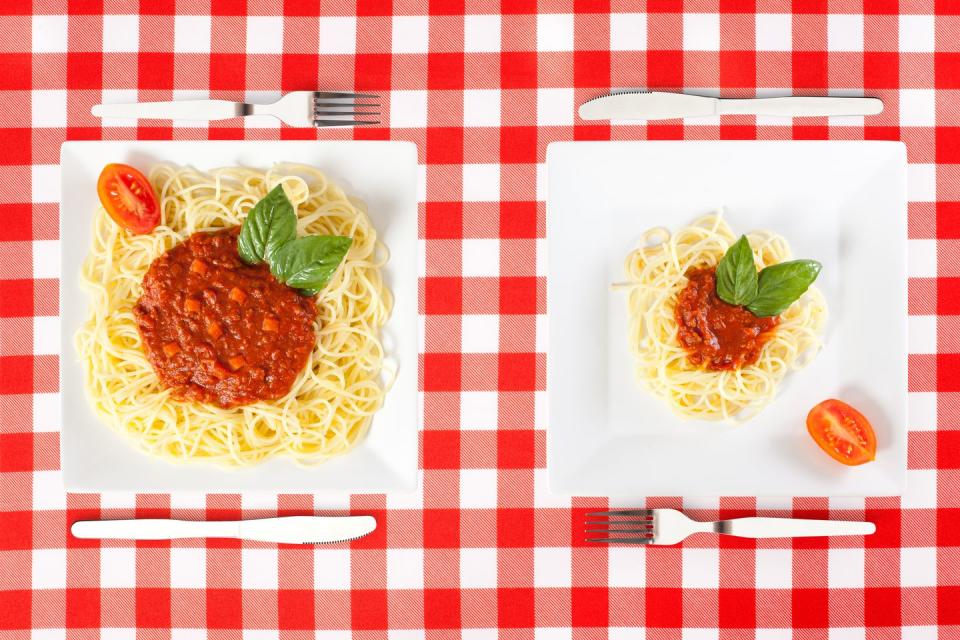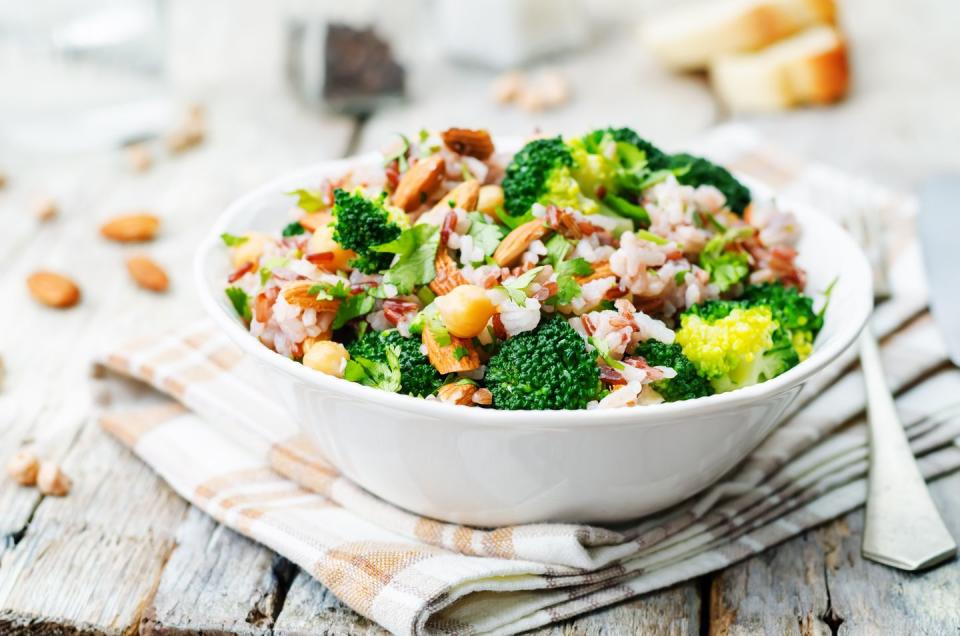7 Reasons Why You're Gaining Weight Out of Nowhere

It’s understandable when you gain a few pounds after vacation or if you break your ankle and spend six weeks propped on the sofa bingeing obscure British cooking shows (and the chocolate scones to go with them).
But when you can't zip your jeans for no freaking reason at all — you swear you’re not eating any more or exercising any less — it can feel like there’s some dark magic at play. You may find yourself standing on the bathroom scale, screaming into the void:
“Why am I gaining weight?!”
Deep breath. You got this.
Most likely, there’s something in your life that’s shifted just enough to make a difference, but not so much that you’d notice, says Alexandra Sowa, MD, an obesity specialist and clinical instructor of medicine at NYU Langone Health. “I see this all the time — you may not step on the scale for a while, and you feel like you haven’t changed anything, and all of a sudden you go to the doctor’s office and notice you’ve gained 10 or 20 pounds,” she says.
But that doesn’t mean it’s your destiny to go up another size every year. Here are some of the most likely reasons for unexplained weight gain, and how to stop it in its tracks.
Your insulin levels may be out of whack.
If you’ve been battling weight issues for a while and none of your efforts are moving the needle, make an appointment with your primary care doc or a weight-management physician, who can assess you for insulin resistance or prediabetes. (Your doctor can also test you for hypothyroidism, in which your thyroid gland doesn’t produce enough hormone, slowing down your metabolism and potentially leading to weight gain.)
“Insulin is the hormone that signals the body to pull glucose out of the bloodstream and store it in the muscles, liver, and fat,” explains Tirissa Reid, MD, an obesity medicine specialist at Columbia University Medical Center and Diplomate of the American Board of Obesity Medicine. “But when you’re overweight, the cells don’t recognize the insulin as well, so the pancreas has to pump out more and more — sometimes two or three times the normal amount — until the cells respond.” (This is also common in women who have polycystic ovary syndrome — a condition in which the egg follicles in the ovaries bunch together to form cysts.)
These high insulin levels keep the body in storage mode and make weight loss more difficult, says Dr. Reid. The beginning of this road is insulin resistance — when your pancreas is working overtime, but blood sugar levels are still normal. All that extra work wears out the pancreas until it can barely do the job of keeping the blood sugar in normal range. Left unchecked, insulin resistance can lead to prediabetes, in which blood-sugar levels are slightly elevated; if that’s not treated, you can develop full-blown type-2 diabetes.
What you can do: The most effective way to reverse this trend is to eat a diet low in refined carbs and added sugars, and to become more physically active, since muscles respond better to insulin after exercise, says Dr. Reid.
She recommends either investing in a fitness tracker or simply using the one that comes with your phone. “People hear you need 10,000 steps each day, which sounds intimidating, but you can also use it just to see where you’re at and make doable increases,” Dr. Reid says. “If you’re at 2,000 steps, try to go up to 2,500 a day next week and continue to increase.” Swapping to foods with a lower glycemic index (GI) — which means they’re digested more slowly, keeping blood-sugar levels steady — is also important for controlling your insulin levels. Dr. Sowa recommends these lower-GI food swaps: riced cauliflower instead of white rice; zucchini spirals or shirataki noodles (made from plant fiber) instead of pasta; and pumpernickel or stone-ground whole wheat bread instead of white bread or bagels.
Stress and exhaustion are throwing you off.
If you’re up at night worrying about your aging parents, your hormonal teens, and the general crappy state of the world, this can affect your metabolism. “Stress and lack of sleep can cause a cascade of hormonal changes that change your metabolism and affect your sense of hunger and fullness,” Dr. Sowa explains.

Stress pumps up the hormones ghrelin and cortisol, which increase your appetite and can make you crave carbs; at the same time, it dials down the hormone leptin, which helps you feel full. Not surprisingly, a recent Swedish study of 3,872 women over 20 years found that the more stressed you are by work, the likely you are to gain weight. Stress also affects your ability to get a good night’s sleep, and we know that lack of sleep can also throw off your metabolism rates and hunger cues.
What you can do: It’s easy — just fix the world and make everyone around you kinder and more sane.
Hm, maybe not. But you can manage your stress by downloading a free app such as Pacifica, (now Sanvello) which can help you work toward personal goals such as thinking positively and decreasing anxiety by sending you meditations and visualizations to do throughout the day. To sleep more soundly, you already know you should put down your phone, computer, and iPad an hour before bedtime, but new research shows that shutting out all light — including that sliver of moon through your window — can help with both sleep and metabolism. A study at Northwestern University Feinberg School of Medicine found that after subjects spent just one night of sleeping in a room with dim light, insulin levels the next morning were significantly higher than those who slept in complete darkness, potentially affecting metabolism rates. So consider investing in some good blackout curtains.
Your allergy pills are to blame.
“We’re not 100% sure why, but it’s believed that histamines, chemicals produced by your immune system to fight allergens, have a role in appetite control,” says Dr. Reid. That means that “antihistamines may cause you to eat more,” she says. A large study from Yale University confirmed that there is a correlation between regular prescription antihistamine use and obesity. Dr. Reid points out that some antihistamines such as Benadryl also cause drowsiness, which could make you less apt to exercise.
What you can do: If you suffer from seasonal allergies and are constantly taking antihistamines, talk to your allergist about alternative treatments such as nasal steroid sprays, nasal antihistamines (which have less absorption into the bloodstream, and therefore less effect on hunger), leukotriene inhibitors such as Singulair, or allergy shots, suggests Jeffrey Demain, MD, founder of the Allergy Asthma and Immunology Center of Alaska. He also says that managing your environment — using a HEPA filter, washing your sheets frequently in hot water, keeping pets out of your bedroom — can help reduce the need for allergy meds. While you’re at it, do an inventory of any prescription medications you’re taking that are known to cause weight gain (including certain antidepressants, beta blockers, corticosteroids, and the birth control shot) and discuss with your doctor if there are equally effective alternatives that don’t affect weight, says Dr. Reid.
Your portions are probably bigger than you think.
Anyone who’s ever sat in a vinyl booth staring down a bowl of pasta big enough for a toddler to swim knows that portion sizes in America are ginormous. But research
from the University of Liverpool published last year found that after being served large-size meals outside the home, people tend to serve themselves larger portions up to a week later, meaning supersizing appears to be normalized, says Lisa R. Young, PhD, author of Finally Full, Finally Slim.

Even if your home-cooked portions have crept up only 5% over the last few years, that can be an extra 100 calories a day, which adds up to more than 11 pounds a year, says Lawrence Cheskin, MD, chair of nutrition and food studies at George Mason University. And the official measure of what’s a “serving” isn’t helping. “The FDA standards for how many ‘servings’ are in a package of food are based on how much food people actually eat, not how much you should eat,” Young explains. For example, to reflect the growing appetites of the American people, a serving of ice cream was increased last year from 1/2 cup to 2/3 cup. More realistic, perhaps, but still more calories than many of us need.
Here's what to do: First, Young suggests you spend a few days getting a reality check on how much food you’re actually eating at each meal. “When you pour the cereal in the bowl in the morning, pour it back into a measuring cup. What you thought was 1 cup might actually be 3 cups, especially if you’re using a large bowl,” she says.
Also, instead of relying on a government agency (or the chef at your favorite restaurant) at to tell you how much to eat, learn to listen to your own body, says Young. “Serve yourself just one modest portion on a small plate, and when you’re done, wait 20 minutes,” she says. It takes that long for the hormones in your belly to reach your brain and tell it you’re full. If you get to 20 minutes and your stomach is grumbling, have a few more bites.
You’re eating the right thing, but at the wrong time.
Let’s say you switched jobs recently, and dinner is now at 9 p.m. instead of 6:30. Or your new habit of streaming Neflix until the wee hours also involves snacking well past midnight. Even if you’re not eating more, per se, this change might account for the extra poundage.
There’s a delicate dance between your circadian rhythm (the way your body and brain respond to the daily cues of daylight and darkness) and your calorie intake that can mean that same sandwich or bowl of fro-yo that you eat at lunchtime may actually cause more of a weight gain when eaten at night. A 2017 study at Brigham & Women’s Hospital found that when college students ate food closer to their bedtime — and therefore closer to when the sleep-inducing hormone melatonin was released — they had higher percentages of body fat and a higher body-mass index. The researchers theorize that this is because the amount of energy your body uses to digest and metabolize food drops as your inner clock tells it to get ready to snooze.
What you can do: There are a few life hacks to keep the late-night snacking to a minimum. Dr. Sowa suggests you commit to writing down every bite you eat after dinner: “Whether it’s on a sticky pad or on an app, keeping track of what you’re eating, how much you’re eating, and how you’re feeling when you eat it will hold you accountable for the calories, and it will also help you figure out if you’re truly hungry or just bored,” she says. She also suggests capping off your evening meal with a brain-and-heart-healthy tablespoon of Fish Oil. “It’s a healthy fat that coats your stomach and makes you feel less hungry later,” she says.
Your “healthy” food is packed with calories.
You could be eating the cleanest, most organic, dietitian-approved variety of plant-based, or ethically farmed food, but that doesn’t mean the calories evaporate into pixie dust when they go in your mouth.

And in fact, research has shown that when you’re eating something healthy — avocados, salad, yogurt, whole grains — part of your attention to fullness tends to turn off. “Even when you’re eating healthy foods, you really have to pay attention to your hunger and satiety signals,” says Véronique Provencher, PhD, professor of nutrition at Université Laval in Quebec City, Canada. “In several studies we have found that when we perceive a food as healthy it creates a bias in our own judgment, and we think (consciously or not) that we can eat more of it, no problem. We think a salad is healthy, so we feel we can eat as much as we want with as many dressings or toppings as we want.”
What you can do First of all, treat eating like going to the theater, and turn your phone off — and turn away from the computer or TV screen. “We have found when you are eating and working on your computer or watching TV or on a screen you are disconnected from hunger and satiety clues,” says Provencher. Something else that may help, other experts say, is to become more aware of portion sizes and what's in your food. Try the Weight Watchers app, which helps you sort out questions like which “healthy” yogurts are full of sugar and calories, and how much avocado you should spread on your toast.
Your age might be a factor.
Each birthday you celebrate brings on one undeniable change: your basal resting metabolism (the rate at which your body at rest burns the energy you take in from food) slows down. “It’s not a dramatic drop,” says Dr. Cheskin. “But as you age, you’re probably also getting less active and more tired, and your body tends to lose muscle mass, which burns calories more efficiently than fat.” So even if you’re eating the exact same amount of food as you did when you were younger, your body is simply not burning it off as effectively as it did during the glory days of your 20s.
Here's what to do: You can only budge your BMR a little, but there are a few things you can do to make the math work in your favor. The first is to build up your calorie-burning muscle, says fitness expert Michele Olson, PhD, a professor of sports science and physical education at Huntingdon College. “Keep up cardio three times a week for 30 minutes, but add challenging weight training on top of that,” she says.
Olson recommends these exercises that can be done at home. Start with what you can do and build up to 2 sets of 12 of each, every other day.
Chair squats: Sit of the edge of a chair with arms crossed; stand up and sit back down for one rep.
Triceps dips: Sit on the edge of a chair, supporting yourself with your arms, slide off, walking your feet out in front of you a few steps; with knees bent and body below the seat, bend elbows; press up until arms are straight. (Use a chair without wheels!)
Push-ups, from your knees, or full push-ups, if you can.
Another metabolism-boosting strategy: Replace some of the carbohydrates in your diet with proteins, which take more energy to digest, therefore burning off more calories through diet-induced thermogenesis, as well as making you feel fuller for longer. Dr. Sowa suggests you eat about 100 grams of protein over the course of the day, filling your plate with lean chicken, fish, shrimp, or plant-based proteins such as garbanzo beans, tempeh, and edamame, to give your meals more metabolism bang for your buck. This may only add up to a weight loss of a few pounds a year, but combined with exercise, the cumulative effect can be significant, says Dr. Sowa.
You Might Also Like


